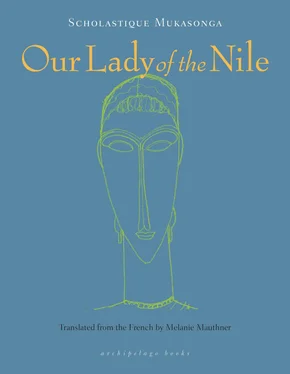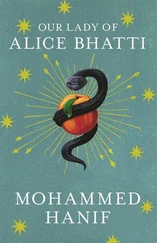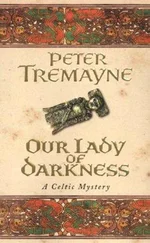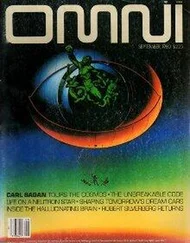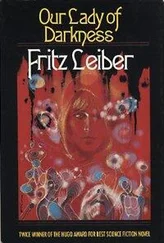“Of course I want children like everyone else. But I want my children to be neither Hutu nor Tutsi. Neither half-Hutu nor half-Tutsi. I just want them to be mine, that’s all. Sometimes, I tell myself it would be better if I didn’t have children. I’m thinking of becoming a nun like Sister Lydwine. With their veils and long dresses, I get the feeling that the Sisters are no longer women like us. Have you noticed they don’t have breasts? I imagine that when you’re a nun, you don’t have periods either. What would be the point?”
“Well, I’m sure Sisters have periods just like every woman. I’ve got a cousin who’s with the Benebikira Sisters. She told me they also hand out sanitary pads, just like we get.”
“All I know is that I don’t want to turn into my mother, and be treated the way she’s treated. Ever since my father became a Hutu again, he’s ashamed of her. He hides her. She can no longer leave the house. It’s no longer she who serves beer to my father’s friends, those who still come visit. He calls for my little sisters. She’s lucky if he lets her go to Sunday Mass: early Mass, not High Mass. He’s even tried to find her a great-great-great Hutu grandfather, a Hutu chief, an umuhinza . Everyone had a good laugh when he came out with that. My older brothers hate their mother, it’s because of her they’re not like everyone else, that people call them mulattos or Hutsi. Jean-Damascène, who’s a solider, says it’s because of her that he’ll always remain a lieutenant, because they’ll never trust him. I’m the only one who still speaks to her, kind of in secret, like with you. As far as I’m concerned, she’s neither Hutu nor Tutsi, she’s my mother.”
“Maybe one day, there’ll be a Rwanda with neither Hutu nor Tutsi.”
“Maybe. Hey, watch out, there’s Gloriosa; hope she didn’t see us together.”
“Quick, go and be with your best friend, Modesta, off you go …”
There were two things that set Monsieur de Decker apart from the other teachers. The first was that he was the only one with a wife. The others were either single — the young Frenchmen, for example — or else they had left their wives behind in Europe, although perhaps their spouses had simply refused to follow them into these remote mountains. In some sense, Madame de Decker was the only true white woman at the lycée of Our Lady of the Nile, since Mother Superior and Sister Bursar were not entirely women, nor entirely white: they were nuns. They couldn’t marry, they would never have children, they no longer had breasts. They’d lived so long in Rwanda that their color had been quite forgotten. They were hybrid creatures — neither men nor women, neither black nor white — that Rwandans had grown used to, just as they had grown used to the landscape of coffee plantations and cassava fields the Belgians had forced them to plant under their rule. As for Miss South, she must’ve been a woman but she wasn’t white, but red, and she was English.
Monsieur de Decker’s wife didn’t always live with her husband in the bungalow. She spent long spells in Kigali, but one always knew when she was here, because the laundry servant would hang Madame’s clothes under the awning behind the villa. The lycée girls hovered around the bungalow to admire Madame de Decker’s wardrobe. They were astonished at the number of dresses hanging there, counting and comparing them; some even tried to fix in their memory the design they liked most, so they could get the tailor to copy it. Madame de Decker’s arrival at the lycée was always highly anticipated, and the subject of fierce discussion. The girls were relieved to finally see a real white woman at Our Lady of the Nile, and the proof: Madame de Decker was blond.
Monsieur de Decker’s other particularity was his lessons. He was our natural science teacher, and his class was quite the Noah’s Ark — every animal on the planet paraded through it. He projected slides onto a white sheet pinned to the blackboard, without much in the way of commentary, showing us the Peruvian llama, the Tibetan yak, the Arctic polar bear, the Friesian cow, the Saharan dromedary, the Mexican jaguar, the Ngorongoro rhinoceros, the Camargue bull, the Indian tiger, the Chinese panda, and the Australian kangaroo. Then came that great day, at the end of the first term, when Monsieur de Decker showed us his own photos, those he had taken up in the bamboo forest, beyond the clouds, on the slopes of the volcanoes, almost at risk to his own life: pictures of gorillas. When it came to gorillas, you could never get him to shut up. Monsieur de Decker was the one and only expert. Much to his wife’s despair, he climbed Mount Muhabura every weekend to observe them; this year, he had even sacrificed his trip back to Belgium for the long vacation. It was as if he’d always lived in their midst. He was most at ease with the dominant male who had let him count his females. A mother gorilla whose young he’d tended remained duly grateful. However much the guides might caution prudence, try to hold him back, Monsieur de Decker had no fear of these great apes. He was familiar with the character of each member of the group, could predict their reactions, and was able to communicate with them. Indeed, he no longer even needed a guide. The gorillas, he felt certain, were Rwanda’s future, her treasure, her opportunity. They needed protecting and their habitat needed to be expanded. The whole world had entrusted Rwanda with a sacred mission: to save the gorillas!
Monsieur de Decker’s pronouncements on the gorillas drove Goretti to a fury.
“What!” she exploded. “Again it’s the whites who discovered gorillas, just as they discovered Rwanda, Africa, and the whole planet! What about us Bakiga, haven’t the gorillas always been our neighbors? And our Batwa, were they afraid of the gorillas when they hunted them with their little bows and arrows? You’d think the gorillas only belong to the Bazungu now. They’re the only ones who can see them, or get close to them. They’re in love with the gorillas. The only interesting thing in Rwanda are the gorillas. All Rwandans must be at the service of the gorillas, tending to their every need, caring only for the gorillas, making them the entire focus of their lives. There’s even a white woman living among them. She hates all humans, especially Rwandans. She lives with the monkeys all year round. She built her home among the gorillas. She opened a health center for them. All the whites admire her. She receives a lot of money for the gorillas. I don’t want to leave the gorillas to the whites. They’re Rwandans too. We can’t leave them to foreigners. It’s my duty to go and see them. And I’ll go. The teachers say the monkeys are our ancestors. That enrages Father Herménégilde. It’s not what my mother says. According to her, the gorillas were once people who fled to the forest, she doesn’t know why, and forgot to be humans. They spent so long in the forest they turned into hairy giants, but when they glimpse a young virgin, they remember how they were once human and try to abduct her, but the females, their legitimate and naturally jealous mates, prevent them by force.”
“I saw that at the movies,” Veronica interrupted, “a huge monkey holding a woman in his hand …”
“I’m not talking about something in the movies. I heard it straight from my mother. Anyway, I must go visit the gorillas. We can’t leave them to the whites; even a white woman who lives only for them. Does anyone want to come with me? We’ll go during Christmas break. I’m sure my father will help me. Who wants to come along?”
They all turned to Gloriosa for her reaction, but she just shrugged her shoulders, burst out laughing, and muttered a few inaudible words, clearly unflattering to the Bakiga. The surprise came from Immaculée:
Читать дальше
